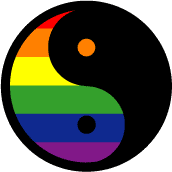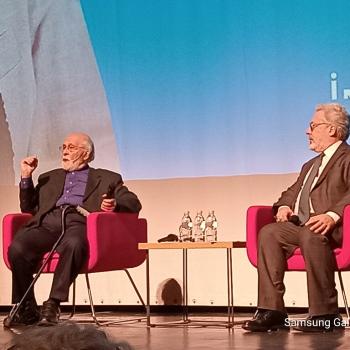By Douglas Carlton Abrams - May 18 2009
 Is there another understanding of gay marriage, and indeed homosexuality, beyond the narrow moralism that so often confines the Judeo-Christian conversation? As the religion editor at the University of California Press, I had the opportunity to explore many of the world's religions. I've also had the privilege of writing books with a number of the world's spiritual masters, to get up close and personal with some of the people who have spent their life on the spiritual path. There are two particular spiritual teachers and teaching traditions that I think can shed much light in a conversation that has been mostly dominated by heat. The first emerges from the traditional religious battleground for this conversation--Christianity--and the other from a quite different Chinese religious tradition--Taoism.
Is there another understanding of gay marriage, and indeed homosexuality, beyond the narrow moralism that so often confines the Judeo-Christian conversation? As the religion editor at the University of California Press, I had the opportunity to explore many of the world's religions. I've also had the privilege of writing books with a number of the world's spiritual masters, to get up close and personal with some of the people who have spent their life on the spiritual path. There are two particular spiritual teachers and teaching traditions that I think can shed much light in a conversation that has been mostly dominated by heat. The first emerges from the traditional religious battleground for this conversation--Christianity--and the other from a quite different Chinese religious tradition--Taoism.
One of the spiritual leaders whom many people believe to have a direct hotline to God is Archbishop Desmond Tutu. In working on his books, I've come to believe that he probably does. The reverence that he is accorded, not only as a spiritual leader but as one of the great moral leaders of our time, is well deserved. It is a rare joy to meet someone who is even more extraordinary in person than their reputation suggests. As someone who has known the evil that prejudice causes, Archbishop Tutu strongly advocates for gay and lesbian rights. He argues that to persecute and exclude any of God's children is blasphemy, since we are all made in the image of God and no one, as he says, is a step-child of God. The Archbishop has said many times that while we may believe in God, God believes in love. It does seem rather strange that we would want to limit anyone's expression of love and commitment. Social and religious conservatives are strong advocates of social stability and structure. The fact that gay and lesbian couples want to settle down and marry can only contribute to strengthening the family bonds that are everywhere fraying in our world.
I've also had the privilege of writing books with Taoist master Mantak Chia. Taoism is blessedly amoral about sexuality. Taoist sexuality comes out of the Chinese medical tradition and sees sexuality and spirituality as intimately linked. This is already a radical idea for a post-Augustinian western world. In addition, since the idea comes from a medical tradition, its goal is to keep us healthy rather than to dictate behavior. A happy and healthy sexuality is seen as being as important as nutrition or exercise to a long and satisfying life. The Taoists call sex "the human herb" and believe that we should make love until the day we die. This also is quite a startling concept for a culture that idolizes hard bodies and snickers at sexuality among older adults. Looking at Taoism allows us to see how so many of the problems in our Western culture come from the fact that we have divorced spirituality from sexuality. We have severed our bodies from our souls. It is no surprise then, that in this crucifixion culture of bodily and sexual denigration, so many people fear sexual expression in all its forms, including homosexuality.
Thus you can imagine that sexual repression was not seen as a virtue in the Taoist tradition. Taoism avoids condemning any part of human sexual experience, since it is all considered part of the Tao. Rather, Taoism tries to teach people how to stay healthy, whatever their sexual preferences. Taoism also sees male and female as much more fluid concepts; we all have masculine (yang) and feminine (yin) qualities, and indeed a full, healthy life includes a harmonious balance of both. Western medical science confirms the fact that we all have varying degrees of testosterone ("male") and estrogen ("female") hormones. If we are able to see the fluidity and range of our sexual identities, desires and characteristics, we are able to embrace a world that is endlessly diverse and resistant to the finger-wagging simplicities of right and wrong.
Perhaps we can ask ourselves to think about gay marriage in the larger context of human freedom, human love and human health. We know that all of these values are strengthened when people are able to choose whom they love and how they love. Whether we look at same-sex marriage through the prism of freedom, love or health, it is worth remembering that none of us can know the mind of God or the mysteries of the Tao. Whatever our personal and cultural prejudices, humility and acceptance are probably wiser attitudes to cultivate than hubris and judgment.
One of the best measures I have found for discerning the depth of someone's spirituality is their ability to laugh. Archbishop Tutu is a prime example; a smile is never far from his lips or a laugh from his mouth. There has not been a lot of laughter around the topic of gay marriage, but I hear Archbishop Tutu chuckling and saying, "God laughs at us and our petty sibling spats, shouting about who is right and who is wrong." Whether we are made by God or by the Tao, our diversity is to be celebrated and cherished, not feared and condemned.




